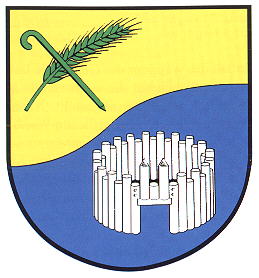Kuden: Difference between revisions
Knorrepoes (talk | contribs) m (Text replacement - "====Official blazon====" to "===Official blazon===") |
Knorrepoes (talk | contribs) m (Text replacement - "====Origin/meaning====" to "===Origin/meaning===") |
||
| Line 12: | Line 12: | ||
(de) Von Gold und Blau im Schrägstufenschnitt geteilt. Oben schräg gekreuzt eine grüne Getreideähre und ein grüner Wanderstab, unten eine aus einem Palisadenkreis bestehende silberne Burg mit offenem Tor. | (de) Von Gold und Blau im Schrägstufenschnitt geteilt. Oben schräg gekreuzt eine grüne Getreideähre und ein grüner Wanderstab, unten eine aus einem Palisadenkreis bestehende silberne Burg mit offenem Tor. | ||
===Origin/meaning=== | |||
The arms were officially granted on January 12, 1995. | The arms were officially granted on January 12, 1995. | ||
Revision as of 19:22, 22 June 2017
This page is part of the German heraldry portal |
Heraldry of the World |
|
German heraldry:
|
Selected collector's items from Germany:
|
KUDEN
State : Schleswig-Holstein
District (Kreis) :Dithmarschen
Amt : Amt Burg-Sankt Michaelisdonn (until 2008 Amt Kirchspielslandgemeinde Burg-Süderhastedt)
Official blazon
(de) Von Gold und Blau im Schrägstufenschnitt geteilt. Oben schräg gekreuzt eine grüne Getreideähre und ein grüner Wanderstab, unten eine aus einem Palisadenkreis bestehende silberne Burg mit offenem Tor.
Origin/meaning
The arms were officially granted on January 12, 1995.
The division and the colours of the arms are derived from the geographical position of the municipality, with sandy soils in the Northern part and marshland in the Southern part. The wheatear is a general symbol for agriculture. The walking stick is a symbol for a local legend, where a man from the area made a long walking journey. When he returned as an old man he could no longer find his old village, as all the inhabitants had died in a plague and the houses were destroyed. He moved a little further and finally founded the village of Kuden.
The lower half shows a palisade discovered in 1994 and dating from early medieval times, symbolising the long inhabitation of the area.
Contact and Support
Partners:
Your logo here ?
Contact us
© since 1995, Heraldry of the World, Ralf Hartemink 
Index of the site
Literature : Reissmann, 1997












